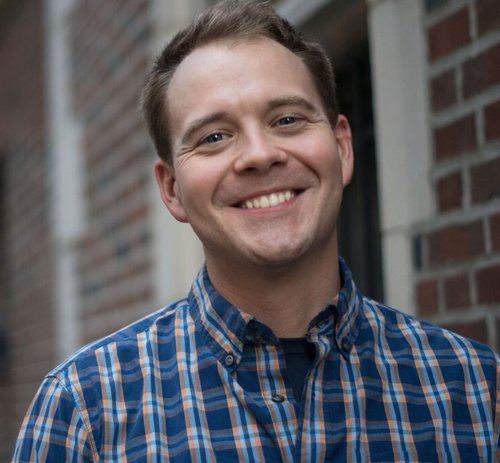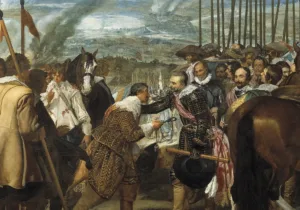This article about peace first appeared in the Winter 2019 issue of Providence’s print edition. To read the original in a PDF format, click here. To receive future issues as soon as they’re published, subscribe here.
Prisoners of History
Much of the human experience is consumed in the pursuit of peace. It is a universal human longing. The peace we pursue is not merely the quiet enjoyment of life’s little pleasures, but the restoration of the real life we were created to enjoy. Something in this world is not right. Something is missing. You sense it. I sense it. Indeed, all of creation groans in longing to be made right again. While we each possess this longing, we rarely possess the peace for which we desire. In this, humanity’s brokenness is truly revealed, in that we are continually unable to achieve that which we collectively desire. Mankind’s failure speaks a greater truth and portends a greater reality, that the source of true peace is not to be found in man. For proof of this, we need to look no further than our own history.
This past November, we marked the centennial of the Armistice of Compiègne, signed on November 11, 1918, which ended the First World War. Called the Great War, WWI was at that time the greatest violent conflagration in human history. For those who survived, it was a conflict unequaled in its scope, immeasurable in its brutality, and the peace born from the ashes was envisioned, of necessity, as an enduring peace. World War I was the war to end all wars, and the peace it produced was to be the never-ending peace to end all wars. At the war’s conclusion, President Woodrow Wilson prophesied that “the object of the war is attained…and attained with a sweeping completeness which even now we do not realize…who will now seek to revive it?” Unfortunately for Wilson, and for Europe, what was asked rhetorically would be answered in reality by the rise of Nazi Germany.
On September 3, 1939, war was revived and the world was again robbed of peace. So like the generations before them, they “looked for peace, but no good came; for a time of healing, but behold terror.”[i] The terror ushered in by Hitler engulfed the entire world in war. The resulting conflict subsumed Europe and Asia and consumed millions of souls on a scale greater than the Great War which preceded it. If history has taught us anything, it is that war is the default for nations, and peace the exception. Reinhold Niebuhr was famous for saying that “society is in a perpetual state of war.” He continued that the peace nations experience “is gained by force and is always an uneasy and an unjust one. Conflict is inevitable, and…power must be challenged by power.”
On May 7, 1945, peace was again achieved. Twenty-seven years after Armistice Day and 60 miles from Compiègne, Nazi Germany signed an unconditional surrender at Allied headquarters in Reims, France. The Empire of Japan would follow suit on September 2, 1945, on the deck of the USS Missouri in Tokyo Bay. In this war, humanity itself was redefined and reimagined in stark relief, as the deep darkness of the human soul was countered by the utter goodness of the human spirit. In the words of John Donne, “As peace is of all goodness, so war is an emblem, a hieroglyphic of all misery.” This particular misery produced a myriad of innocent victims, a host of righteous victors, and a generation utterly determined to prevent such miseries from becoming emblematic of the future.
For the post-World War II world, peace would not merely be defined by the absence of war, but the presence, protection, and enjoyment of human rights. By 1948, representatives of nine nations united to draft a declaration and definition of those rights. Spanning 30 articles, the Universal Declaration of Human Rights attempted to lay out those rights and privileges that its drafters recognized as essential to the full enjoyment of the human experience. While the rights professed were universal, the acceptance of the document was not, as 10 of the 58 member nations abstained or voted against the Declaration. The subsequent seven decades have sadly given witness to the power and values behind those abstentions.
The Intractable Problem
For the ideological left, it is an enduring mystery why peace cannot be achieved by those who will it. John F. Kennedy in his notable commencement address to American University in 1963 (eight years after Americans began their involvement in the conflict in Vietnam) stated:
Our problems are manmade—therefore, they can be solved by man. And man can be as big as he wants. No problem of human destiny is beyond human beings. Man’s reason and spirit have often solved the seemingly unsolvable—and we believe they can do it again… For, in the final analysis, our most basic common link is that we all inhabit this small planet. We all breathe the same air. We all cherish our children’s future. And we are all mortal.
For most liberals there is a fundamental goodness in man which can and should be able to overcome that which is bad in mankind. This belief is the aspiration of humanists and the frustration of generations of progressives who view history’s successive calamities as a series of avoidable aberrations. These same progressives face discouragement when peace remains elusive, and instead of reconciling to reality will often double down on failed strategies combating misunderstood problems.
For conservatives, however, the calculation is different. For the ideological right, the question is not why there is war, but why we should ever expect there to be peace. For Christians, calamity is the norm and peace is the exception; and why should this not be the case in a fallen world?
The darkness which shadows continents and creates concentration camps is not “out there;” rather, it is “in us.”
Hannah Arendt, the author and journalist who covered the trial of Adolf Eichmann and chronicled the twentieth century and its moral horrors in such works as Responsibility and Judgment, makes this observation with subtle brilliance:
I was struck by the manifest shallowness in the doer [i.e., Eichmann] which made it impossible to trace the incontestable evil of his deeds to any deeper level of roots or motives. The deeds were monstrous, but the doer—at least the very effective one now on trial—was quite ordinary, commonplace, and neither demonic nor monstrous… The sad truth is that most evil is done by people who never make up their minds to be good or evil.
The “banality of evil” Arendt observes in the aftermath of World War II is anathema to humanists, but all too familiar to Christians. What Arendt recognizes as banal, Christians recognize as the ubiquitous presence of sin. This perfusion of personal evil demands a powerful solution; its presence elucidates the need for the universal savior which Christ represents. It is this same evil which plagues the pursuit of peace. Every effort to achieve some measure of détente is stalked by the specter of mankind’s inability to leave well enough alone.
So how do we avoid discouragement on the path to peace? One would do well to remember that there are three realities in this fallen world which inform our pursuit of peace. All those who desire peace would do well to think on these three truths: human peace is costly, human peace is imperfect, and human peace is penultimate.
The Price of Peace
Peace by definition is the restoration of an equilibrium, a balance. Achieving this balance is always costly; both sides must sacrifice to achieve it. Something must be given up for peace to be achieved; absent this sacrifice, inequality will prevail. This is what is envisioned by shalom, that there is a holistic enjoyment of balance between creator and creation. The restoration of this balance is costly; there is no way around it, and we ignore this reality at our peril.
Every great evil presents us with a costly choice: we must either capitulate or confront. To capitulate is to make peace with evil on its terms and accept its presence in our world as uncontested. Many, seeking to protect their virtue, mistake this as a free path to peace, only to discover that such peace comes at the expense of the virtues they sought to protect. To confront is to challenge evil for what it is, an unnatural trespasser into God’s good creation; and like all trespassers it must be ejected, by force if necessary. While confronting injustice may cost our lives, few in history would argue that such a sacrifice was in vain.
Christians have a unique understanding and perspective to contribute to this view. Unfortunately, there is not unanimity within Christianity on the value of confrontation. Many laud Christ as a peacemaker and view his meekness as a model for earthly and political pacifism and capitulation. What they often fail to acknowledge is that the peace which Christ inaugurated was made, in the words of the Apostle Paul, “by the blood of his cross.” Jesus boldly confronted evil and was in no way passive in his submission to death. In laying down his life upon the cross, he took up the sword and weaponized that same cross in the struggle to make all things new. We kid ourselves if we think that peace and restoration in our time will be any less costly.
The Imperfect Peace
One of the reasons that peace in our time is so elusive is that our experience of peace in this world is imperfect. Once the war is over, the trial is done, and the treaties are signed, we find that the costs we exacted from each other to achieve rapprochement have left us unsatiated. Justice in this world is never fully satisfied. The wounded can never fully be made whole. This is a constant source of mystery to secularists, humanists, and some liberal Christians who nurse a futile hope in mankind’s exceptionalism. Every time some measure of peace is achieved, they say to themselves that this time it will be different. And every time this peace displays its imperfections, they wonder at what could have gone wrong.
The classical or orthodox Christian mindset, however, finds such imperfections more a source of lament than wonder. It is no mystery for Christians that imperfect humans produce an imperfect peace. In fact, this reality is at the heart of our apologetics and is the root of our evangelism. If liberalism’s weakness is to put too much stock in earthly peace in the present, then conservatives can often be faulted for undervaluing peace and abandoning its realization to the eschaton. While we must recognize and lament these imperfections, we cannot allow their presence to detract from the mission we have as peacemakers. The elusiveness and imperfection of peace do not excuse us from its pursuit. For every experience of peace in our lifetimes serves as a connection to the eternal peace to come, and it is the role of Christians to make that connection clear.
Penultimate Peace
The hardest reality which besets earthly peace is that it is penultimate. No matter how complete, no matter how glorious, its glory is but fleeting. Wars beget treaties; treaties beget wars, and so the cycle goes. This impermanence is an endless source of frustration to diplomats and politicians, and a source of constant surprise for all those unable to grasp the lessons of history. How one assesses this reality speaks volumes about one’s understanding and disposition toward contemporary issues.
Dietrich Bonhoeffer, the German pastor-turned-would-be-spy-made-martyr, elucidates this tension in his book Ethics. There are two errors that we can commit: we can be “radical” and emphasize the ultimate and neglect the penultimate entirely, or we can “compromise” and focus solely on the penultimate with little regard for anything in the future. So often these are the choices we face within the public sphere: focus solely on peace in the here and now, or focus solely on the future as if peace in the here and now does not matter. While there are notable Christians on both sides of this divide, for Bonhoeffer, Christ alone provides a solution and redeems both the penultimate and the ultimate. His presence was a physical reality in space and time, which redeemed the present, and his sacrificial work in time had and continues to have an eternal impact. We would be wise to recognize that the fight for peace in the here and now matters because the penultimate, however unsatisfying, matters.
These realities add context to the fight, meaning to the struggle, and hope amidst the despair of our fallen pursuit of peace. This imperfect peace we experience is worth the cost because of what it represents in the present and what it points to in the future. Christians are uniquely positioned to speak a glorious truth that Christ is the Prince of Peace who was and is and is to come.
Drew Griffin is managing editor of Providence.
Photo Credit: This acrylic painting was created on two 24×24 inch canvases to depict war and peace. The artist created the piece to further his abilities with acrylic paint. U.S. Air Force art by Staff Sgt. Jamal D. Sutter.
[i] Jeremiah 8:15.







 Sponsor a student for Christianity & National Security 2024
Sponsor a student for Christianity & National Security 2024